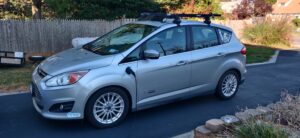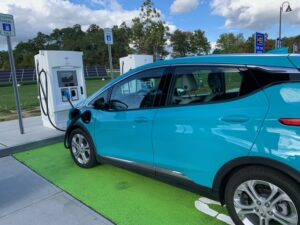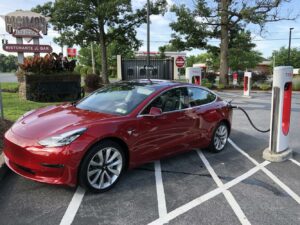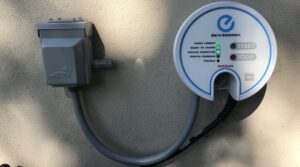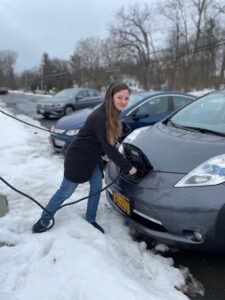Read testimonials from EV drivers across New York
May 11, 2021
Paul Dibenedetto, Long Island
Below is a photo of my car charging at home using the charger Ford gave with the car. It hooks up to a 120v outlet. In the summer the electric range is about 23-25 miles and in the winter, that drops to about 13-15 miles of range. Overall, the lifetime mpg is about 52 mpg and because the car shows how many miles are driven in electric versus gas, it’s about a 60/40 ratio of driving on electric/gas.
I bought the car with 19K miles in 2016 and now the car has 92K miles. My next car will most likely be fully electric.
Prof. Yelleshpur Dathatri and Geetha Dathatri, Medford
Vehicle: Hyundai Kona Electric
Year of Purchase: November 2019. Model year 2019
Purchase price: without rebates and credits: $39,000
New York State incentive at the dealership: $2,000
Federal Tax Credit: $7,500
High Speed home charger: Charge Point PSEG credit $500
Range on full charge: winter months around 250 to 280 miles
Summer months: 360 to 380 miles
PSEG Long Island energy incentive: 3 cents per KWh charged during off peak hours (11 pm to 6am)
Approximate savings compared to a gasoline vehicle: At least 50% in fuel costs.
For the past nearly 12 years we have been driving hybrid vehicles with gasoline back up. We wanted to try a pure electric vehicle and after some research on various factors, we pitched on the Hyundai Kona Electric model. The incentives and tax credits have been very attractive. The support by the local utility to pure electric vehicles is commendable.
We are extremely happy to be driving a clean vehicle which does not produce any pollution locally. We do not have to go for any oil change and such maintenance items.
The range on full charge has not been a constraint since we drive mostly locally. Options exist to charge the vehicle when driving a little farther distance. As more and more charging options increase on the highways, we believe, electric vehicles are the future of the automotive industry.
Portia Zwicker, Niskayuna
1. What first inspired your decision to buy an electric vehicle and what was it like to make this transition?
I’d been wanting to switch to electric for a couple years to get off gas. I’m a climate activist, and while I know major change has to come from higher up, I also make as many personal changes as I can. Being able to make this change was indeed a privilege.
2. Which electric vehicle do you own? Why did you choose this make and model?
We replaced my gas car with a 2020 Chevy Bolt LT that we are leasing. Two months later, we replaced my husband’s gas car with a used 2017 Chevy Bolt Premier which we have bought. So we have two Bolts.
3. Have you found that you’ve saved money on fuel and maintenance costs by owning an electric vehicle compared to a conventional vehicle (if you owned a conventional vehicle in the past)?
Yes, absolutely. We have not bought any gas since obtaining these EVs, and of course, no oil changes, transmission issues…I did get a flat tire I had to replace but that was my fault haha.
4. Did you use any available EV funding sources to assist with your purchase? If so, which ones? Was the funding process difficult to navigate?
Unfortunately not since federal funding is no longer available for Chevrolet EVs. The 2020 car is a lease and we are not the original owners of the 2017 car.
5. Do you charge your car at home or use public chargers? Can you expand on your experience with charging at home and/or in public?
My husband charges on a level 2 for free at work. I work from home and don’t drive much so I easily get by charging at home on a Level 1. However, I definitely take advantage of public charging when I’m out and about. Most public level 2 stations are free!
6. What would you say to an interested buyer with range anxiety and concerns about charging?
I have zero range anxiety with day-to-day around-town driving. If you have a typical or average commute, you can get all you need by charging overnight on level 1 (standard 120v outlet). We haven’t done much long-range driving yet (thanks COVID), but our one trip to NYC and back was totally doable with two stops (one each way) at DC fast charging stations at rest stops.
Jeff Krenn, Queens
1. What first inspired your decision to buy an electric vehicle and what was it like to make this transition?
I am both a huge advocate of environmental sustainability and a huge bleeding edge tech nerd. When I first learned about Tesla, I became enthralled in the idea of one day owning what represented a physical manifestation of a perfect marriage of these two concepts. Transitioning from a gas car to an all-electric EV wasn’t difficult but as I live in a downtown setting with no garage or driveway to park and charge in, I did rely on the ability to charge at work and publicly. This directly impacted my decisions around who I would and would not work for when I lived in an area of upstate new york that demanded I drive daily; now that I’m living in NYC it forced me to prioritize finding a parking garage with vehicle charging and negotiating a monthly parking rate that would include it.
2. Which electric vehicle do you own? Why did you choose this make and model?
2018 Tesla Model 3 (Long Range first production, RWD, with Enhanced Autopilot and Full Self Driving add-on packages). This was the first Tesla Model 3 variant available and I reserved it two years in advance, then took delivery in July of 2018. I chose this model since it was the first one available that was within a feasible purchase and ownership budget for me, and I chose the version I did because I wanted the longest range battery possible, along with all the upgraded tech options available at the time and for the foreseeable future via software updates.
3. Have you found that you’ve saved money on fuel and maintenance costs by owning an electric vehicle compared to a conventional vehicle (if you owned a conventional vehicle in the past)?
I’ve absolutely saved money on fuel and maintenance. In the first year alone my savings were many thousands of dollars, since there’s been hardly any need to pay for charging except on long trips (supercharging is not free, but most public charging options are), and there’s been zero maintenance outside of tire rotations and a few repairs which are covered by Tesla. Oil changes are a thing of the past!
4. Did you use any available EV funding sources to assist with your purchase? If so, which ones? Was the funding process difficult to navigate?
I took advantage of the full Federal Tax Credit incentive ($7500) and the NY Drive Clean instant rebate (I believe this was $2k or $3k, I can’t recall now). The NY Rebate came off the purchase price instantly without my having to ask, and the tax credit was processed automatically as well. Both were simple and seamless processes that required minimal effort on my end to secure.
5. Do you charge your car at home or use public chargers? Can you expand on your experience with charging at home and/or in public?
As I mentioned above I do not own a property that affords me the ability to charge at home, so I am at the mercy of public charging infrastructure and availability. That said I mostly charged at work in 2018 and 2019 when I lived upstate, and upon moving to NYC, I now mostly charge at my parking garage, as I chose one that agreed to include it with my monthly fee. In advance of taking a drive I ping the garage and ask them to charge the car ahead of my pickup time, and everything goes pretty smoothly for me in that regard.
6. What would you say to an interested buyer with range anxiety and concerns about charging?
If you have range anxiety I cannot recommend Tesla enough since they are the only EV company that has prioritized creating a proprietary network of superchargers that keep you on the road with minimal delay. in fact I actually enjoy long trips more now, knowing there is a baked in break each 2.5-3 hours of driving, during which my fiancé and I will eat or take a bio break or just sit and read/scroll our phones for a bit, recharging our own batteries for the drive while the car recharges itself. I do not think I’d enjoy relying on public Level 2 charging for road trips since it is quite slow and availability is not reliable in many rural and less population-dense areas of the country.
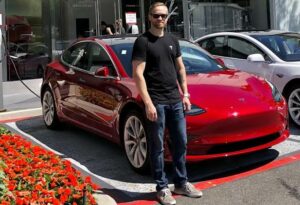
Cynthia Braun, Westchester
“I love my EV! I was concerned initially that I would have “range anxiety” about running out of charge in an inconvenient location, but I have found chargers are plentiful and easy to access. Also, we installed a home charger so every morning I leave the house with 200 miles on my battery. It turns out that this is more than enough for my typical daily driving. Even on long trips, we’ve found it’s refreshing to stop for a half hour at a Super Charger site when needed. We stretch our legs, get a cup of coffee, and walk the dog. Traveling this way is surprisingly easy and pleasant! I also love never going to the gas station! EV’s need so little maintenance that we save money and time that way, too. We’ve been delighted with our EV & recommend one to everyone!”
June and Jeffrey Stumpf, Westchester
Quote for carousel & landing page: “You can charge at home using a portable charging cord from a standard 120 volt standard home outlet or charge from a 240 volt outlet. A 240 volt charging station can be mounted outside your house (like ours) or in the garage. You can typically top off and charge at home overnight from 120 or 240 volt. I generally charge at night and have 100% charge the next day…Very long trips require planning, since the electric charging station infrastructure is not as built-out as the gas station infrastructure… There are apps that can help you find charging stations on the go…. The only thing I miss about gas stations are the snacks!”
Mike Jaklitsch, Queens
The purchase process was simple compared to any past experience with ICE vehicles in the past. Driving an EV, especially a Tesla, is unlike any other driving experience. Plus my Model S improves with age via regular software updates. How many other cars can boast about that?
Nicholas Palumbo, Long Island
The purchase process was simple compared to any past experience with ICE vehicles in the past. Driving an EV, especially a Tesla, is unlike any other driving experience. Plus my Model S improves with age via regular software updates. How many other cars can boast about that?
Bobby Parchuri, Long Island
1. What first inspired your decision to buy an electric vehicle and what was it like to make this transition?
I was looking for something more environmentally friendly with better performance which is hard to find with traditional vehicles, it’s usually a compromise of one or the other. Making the switch was easy but I did do my research ahead of time to know what to expect.
2. Which electric vehicle do you own? Why did you choose this make and model?
I own a 2018 Tesla Model 3. It was the only model on the market with 300 miles of range under $60,000. It also has the benefit of utilizing Tesla’s supercharger network for long distance travel.
3. Have you found that you’ve saved money on fuel and maintenance costs by owning an electric vehicle compared to a conventional vehicle (if you owned a conventional vehicle in the past)?
I can say that I have saved money on maintenance and fuel but the amount is small considering the car is a depreciating asset and the money saved on fuel and maintenance is dwarfed by the depreciation of such an expensive car.
Since PSEG launched Smart Charge Rewards which credits back $0.05 of the approximately $0.20 for each kWh used for charging overnight, charging the car has made the fuel cost more economical.
https://www.psegliny.com/saveenergyandmoney/greenenergy/ev/smartchargerewards
4. Did you use any available EV funding sources to assist with your purchase? If so, which ones? Was the funding process difficult to navigate?
I used the federal EV rebate of $7500 which was available for Tesla’s at the time. It was easy to include in my tax return for that year and it got refunded when I received my tax refund. I was also able to use NY State Drive Clean Rebate which is a $2000 EV rebate and all the paperwork was handled by the seller and the amount was deducted from the final price of the car.
5. Do you charge your car at home or use public chargers? Can you expand on your experience with charging at home and/or in public?
I charge both at public stations and at home.
At level 2 public stations, the ones you will find in parking lots of retailers or public buildings, the charge rate is relatively slow. If the car is charging for an hour or two, it can recoup the energy used to get there and back, useful for a plug in hybrid or a car with a smaller battery pack. With the Tesla, I usually have ample range to not have to worry about that. Oftentimes if there is a fee to use these chargers, it is not worthwhile as charging at home is much less expensive.
At level 3 stations, such as the Tesla Supercharger network, I can stop for 20 minutes and get back 150 miles of range. I have used these many times when taking long trips on the interstate. The cost is fair considering the speed of charging and is still much less than the cost of gas. The car will use the navigation system to route you through the network to stop at appropriate charging locations, this is all done automatically. Many people see the 20 minute fueling stop as long, but unlike gasoline, all you need to do is plug it in and walk away. I find this time useful to use the restroom, get a snack or relax for a few minutes after driving for several hours. The car is usually ready to go before I am.
Lastly, I do most of my charging at home. I purchased an EV charging station similar to a level 2 station you will find in public areas. PSEG has a $500 rebate which offsets most of the cost of the charger. Installation was simple as the charger plugs into a standard dryer/oven/RV receptacle which is common in many houses already or can be added in easily if the electric panel is nearby.
Using this, the car will charge fully overnight. It is very convenient being able to arrive home, plug in, and be fully charged for the next drive. I don’t have to worry about fluctuating gas prices, or the need to go out of my way to stop at a gas station, waiting in line and at the pump before getting to my destination.
6. What would you say to an interested buyer with range anxiety and concerns about charging?
A Tesla is a great choice for a primary car. It has the range for 99% of drives, and for the few times a year most people will take long road trips, the supercharger network acts just like gas stations along your route allowing you to recharge quickly and get back on the road. I never have to worry about range and the car is aware of its state of charge and helps navigate to charging locations if it becomes an issue.
Charging at home is not a problem, even a regular outlet will charge the car and return about 50 miles of range overnight. When visiting other people, I have plugged into dryer outlets or standard receptacles and never had any problems. I like to remind people when charging infrastructure is questioned, even in the most remote areas, electric service is more common than a gas station. Nearly every building in this country has electric service so charging the car, although slowly, can happen almost anywhere.
More planning would be needed for other electric cars as there are not as many level 3 charging stations available. These would still make great cars if you had another vehicle available to use for long drives. The cost to run and maintain a simple electric vehicle is orders of magnitude less than their gas counterparts. As the initial purchase price continues to decline or if you can buy an already depreciated used vehicle, it makes the financials much more attractive.
Andrea Shaye, Albany County
What first inspired your decision to buy an electric vehicle and what was it like to make this transition?
My husband and I have been Toyota Prius owners since 2005, and we were excited about a new car that could further reduce our impact on the environment. At one point, he purchased a cheap used car that he was going to convert into an EV, but that plan never came to fruition. While working to complete my MBA, I completed a course which focused on business and the environment, and I wrote a paper about the Nissan Leaf. This was prior to the car’s release as the first mass-produced EV for purchase. The transition to the Leaf was seamless for us. Initially, my husband commuted 80 minutes a day in it, and we continue to use it as our primary car for local errands and visits.
Which electric vehicle do you own? Why did you choose this make and model?
We own a 2013 Nissan Leaf. We appreciated that the car was built with the intent of creating an EV as opposed to those that companies had created as gas models with an EV option available. Although they weren’t a big factor in our purchasing decision, we enjoy the heated seats and steering wheel and the quick pick-up. At the time, I only remember Tesla as the other EV option on the market we would have considered, and there were none in our price range.
Have you found that you’ve saved money on fuel and maintenance costs by owning an electric vehicle compared to a conventional vehicle (if you owned a conventional vehicle in the past)?
We have absolutely saved money since we don’t need any oil changes or upkeep on a gas engine. So far, maintenance costs have been minimal. We didn’t notice a major difference in our electric bill, and we charge for free all over town.
Did you use any available EV funding sources to assist with your purchase? If so, which ones? Was the funding process difficult to navigate?
Yes, we received the $7500 federal tax credit which was very simple to navigate. That was the most excited I’ve ever been to file my taxes.
Do you charge your car at home or use public chargers? Can you expand on your experience with charging at home and/or in public?
It is so awesome to be able to charge up right in our own home. We had a 220 charger installed, so we usually only need a few hours to get back to full after we’ve been out. The app makes it easy to check the charging status and start the climate control. When my husband was commuting 35 miles to work, he was able to charge up at his office, too. Our favorite grocery store has charging stations, so we fill up for free when we do our shopping trips.
What would you say to an interested buyer with range anxiety and concerns about charging?
In my 8 years of owning our Leaf, I’ve never been stranded. The gauge makes it very clear how much farther you can drive on the charge. And electricity is even easier to come by than a gas station if you’re really in a pinch! With EVs available today, ranges are increasing. Charging stations are only going to become more plentiful as the current administration works to expand environmental protections and promote more sustainable automobiles.
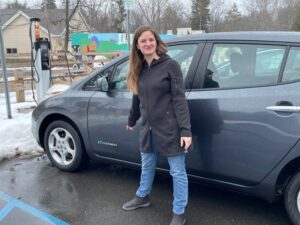
< Back to Our Work
Related Articles
THANK YOU TO OUR PLATINUM CORPORATE PARTNERS
Website by Trillion.
© 2017 New York League of Conservation Voters Education Fund. All rights reserved.

